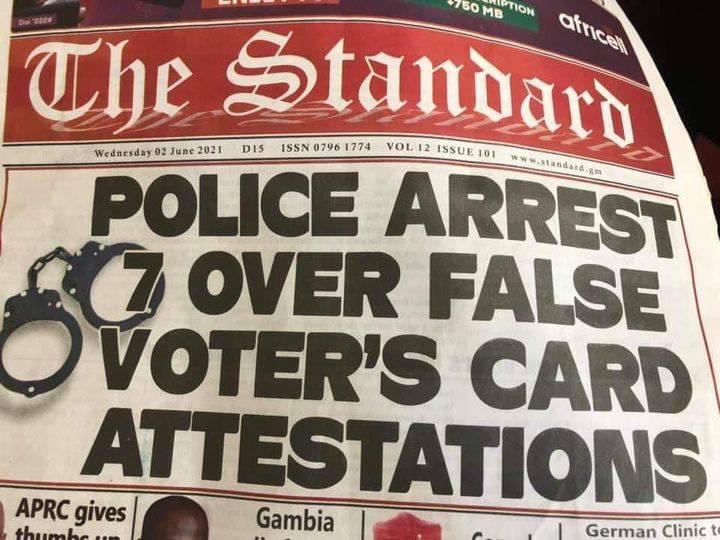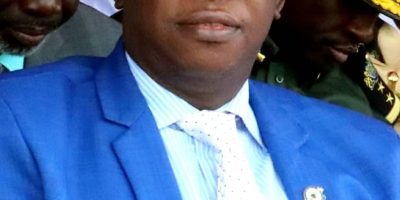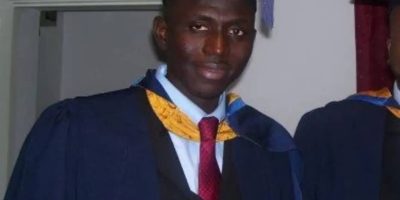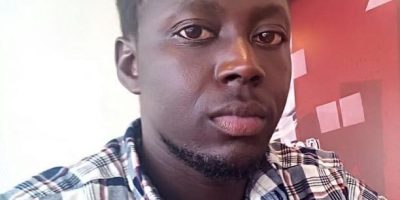Alagi Yorro Jallow
 Fatoumatta: Journalism is the world’s most potent profession; it is a profession of verification and skepticism, not cynicism. Today, journalists in the Gambia have lost a sense of their role in society because of the impunity of peddling fake news or misleading information presented as news.
Fatoumatta: Journalism is the world’s most potent profession; it is a profession of verification and skepticism, not cynicism. Today, journalists in the Gambia have lost a sense of their role in society because of the impunity of peddling fake news or misleading information presented as news.
Some quack journalists who work in the service of truth, including the “inconvenient truths,” can find themselves becoming pathological liars and spin doctors and purveyors of demonstrably false information presented as fact to deceive the public. Gambian journalists’ current role has significantly impacted the quality of democracy by manipulating mass media to undermine the democracy is immoral of a journalist.
I have learned that an essential principle of a journalist is to QUESTION! QUESTION! QUESTION! which is missing in the contemporary Gambia independent media.
Fatoumatta: Over the years, the ethics and credibility of Gambia’s news media make for worrying reading. Excellent journalism dominated the Gambia’s media landscape for over 100 years. Furthermore, its editors and newspapers were also considered the most potent editors during colonial times. Also, Gambian journalists were exceptional in ethical standards in the Second Liberation struggle.
The lapses of unethical practices included factual inaccuracies in reports on allegations of false reporting and engaging in political propaganda in favor of the highest bidder. Another major bombshell story was about a FALSE VOTER’S CARD ATTESTATIONS. The Standard newspaper was found culpable for fabricating false news and spinning by the Gambia Police Force. Standard had ‘failed in the most basic tenets of journalistic practice.
The media’s ethical standard failures included not giving any – or adequate –an opportunity to affected parties to respond to the stories pre-publication. Others included failing to seek credible and sourced validation of the allegations made against individuals and public institutions.
Now, all are aware that Gambia’s mainstream media is an expensive harlot who offers her services to the highest bidder—usually influential and powerful politicians. Therefore, they should not fall for this Pharisee-like move of pretending to clean the outside of the cup when the inside carries death and decay. By tomorrow morning, the media will be back to its usual manipulative, dumb, and shallow self. Public trust in the Gambian media is at a new low; a radical rethink of journalism is needed.
Fatoumatta: Gambian journalism has much work to do to rebuild this lost trust not only for their own sake but given the growing crisis of disinformation. It is widespread suggests that a more significant number of the Gambian population distrust the private media. Moreover, a worrying higher number of Gambians have problems distinguishing news from “fake” news. If journalists want the public to listen and trust them, they have to listen to the public. If journalists wish the public to care, then journalists have to care about the people.
However, is a nation as transparent as its MEDIA? A government is also as CORRUPT as its MEDIA. The more corrupt a nation’s media is, the more corrupt that country is also. The corruption of a government is directly proportional to the corruption of its media. We can also replace the word ‘media’ with ‘social critics,’ and the import of the sentence remains the same.
However, responding to false, inaccurate, and misleading publications in the Standard, the office of the Inspector General of Police issued the following embarrassing public statements as follows:
“The Office of the Inspector General of Police is utterly dismayed by a false lead story published by The Standard newspaper on Wednesday 2nd June 2021, captioned “Police Arrest 7 Over False Voter’s Card Attestations” by Mafugi Ceesay. The Office of the IGP would like to state in categorical terms for the records that not only is the story false, but a deliberate attempt to mislead the public and thus create unnecessary confusion.
According to the reporter, the seven individuals were arrested by Police stationed at Farato on Monday 31st May 2021. This in itself is misleading and clearly unprofessional as our records of the said police post have none of the above. Thorough verification of our records at the police post at Farato, including the station diary and all other relevant documents, cannot support or substantiate the reporter’s claim.
“Further verification at nearby stations showed no record of such arrest throughout the whole Upper West Coast Police Division. Our daily situation reports across the country also indicated no such arrest since the beginning of the voter registration process”.
“Probes into the reporter’s claim that one ASP Lamin Mballow confirmed the story also proved him to be untruthful as there is no such name holding such rank in the entire West Coast Region among our officers.
This desperate attempt to soil The Gambia Police Force does not only manifest gross unprofessionalism but also amounts to false publication under the Criminal Code of the Gambia”.
“Any journalist that worth his or her salt should know such basic principles in fair and objective reporting: get your facts right before going to the newsroom.
The Inspector General’s Office wishes to remind all media practitioners to observe ethical principles and codes of conduct in executing their duties and desist from misleading the public with information about imaginary crimes calculated only to cause fear and panic within society.
We urge reporters to confirm facts with the Public Relations Department of the Police and not with any other individual,” according to the police statement.
Fatoumatta: Standard newspaper publication reveals that the failures of false reporting had caused significant emotional and financial harm to the people concerned, their families, and their careers. Having ethical lapses on such a considerable scale can only further erode the media’s public trust. Other journalists and media houses in the Gambia fabricated allegations made in their media houses based on distorted facts leading to a widespread outcry. It was pointed out that some Gambian media practitioners undermined their credibility and further eroded trust in journalism.
Regardless of their political affiliations, today’s media blackout on government activities ought to be of concern to everyone. By refusing to cover any aspect of the government’s malfeasance, the Gambia’s media fraternity has demonstrated that it is indeed the “fourth estate”—the fourth arm of government. It exists only to maintain the status quo and to guard the interests of the ruling elites. The independent media is serving as the “main opposition party “filtered through a liberal democratic lens. Such media is unable and unwilling to articulate the views and aspirations of the masses of the people. However, this is not the type of journalism inherited from the doyens of Gambian journalists. The revolution will not be televised. The relationship between the media and the reality of change and revolution in the streets and Bantaba’s of the Gambia has never been televised in the new Gambia. So, how should this rebuilding of trust be done? Not by merely superficially papering over ethical cracks nor overhauling the well-functioning media regulatory system. While apologies for and corrections of mistakes are essential to show public accountability, journalists should also recommend the principles underlying these processes.
The country’s press code highlights the public interest as the central guideline. This entails, aside from striving for truth, avoiding harm, and acting independently, the reflection of a multiplicity of voices in the coverage of events, showing particular concern for children and other vulnerable groups, and being sensitive to the cultural customs of readers and the subjects of reportage.
Fatoumatta: This emphasis on diversity of voices and awareness of social context should be the starting point for any attempt to regain the public’s trust. As the code states at the outset: One way of doing good journalism is to adopt an “ethics of listening and ethics of having a moral rectitude.”
The central theme of my argument is that journalists must reach beyond their usual audiences to include those that generally appear only on the margins of media coverage. Furthermore, they must review how those voices are reported and how they appear in the media. This approach will result in a more genuine dialogue and a more participatory approach. This could, in turn, contribute to a thorough reassessment of the media’s relationship with the public in a way that could rebuild trust.
To some extent, exceptionally broadcast journalists should be similar to the much older tradition of “public journalism.” It provides that the media should address citizens not merely as spectators or victims but empower them to solve their problems. One way this was done was to host public discussions and facilitate meetings to support deliberative democracy. The potential for digital media platforms to connect journalists to audiences has also been explored. Applying this approach in the Gambia would have significant benefits. The country is socially, politically, and tribally polarised and highly unequal. Making the extra effort to actively listen to voices outside the journalists’ average target audiences, exceptionally marginal voices, would transform the narratives being shared. This would help journalists gain broader social legitimacy among those who may feel the media is disconnected from their everyday lives.
However, ethical listening does not merely accommodate voices from marginalized communities, only to treat them as victims or as objects of pity. Instead, it requires a fundamental revision of the relationship between journalists and their various audiences, one in which power relations are radically revised or overturned. A more reciprocal relationship with their divergent audiences would require journalists to let go of their desire to control the narrative or tendency to listen only to obtain answers to questions already formulated.
Of course, this does not mean that journalists no longer have any say over their reporting. Nor that they do not have to take any ethical responsibility for the questions they ask. The difference in this kind of listening is that it creates an authentic dialogue. The responses are allowed to alter, shift, and speak back to the original agenda rather than be made to fit into it.
Fatoumatta: Listening can, therefore, be seen as fundamental to democratic politics because it constitutes a public sphere premised on participation, tolerance, and inclusion. The training has been identified much more extensive, systemic problems in the broader Gambian media landscape. These include revenue challenges to media outlets, shrinking resources for training, and the effective exercise of editorial checks and balances. It also listed the pressure, fuelled by social media, to break stories ever faster amid competing misinformation and disinformation narratives and societal pressures. Linked to rebuilding trust should be a solid commitment to support community media and the public broadcaster to add to the diversity of voices.
Fatoumatta: There can be little doubt that ethical lapses have added significant dents to the media’s public trust. An appropriate response to the ethical problems plaguing the Gambian media requires thinking about the question of ethics as a more radical project – one which involves a reaffirmation of journalism’s central values, a recommitment to media diversity, and exploration of new practices that can reconnect journalists to citizens. These are the tasks that journalists need to take seriously to restore relationships of trust with the public.




Ma sha Allah great and thanks for sharing